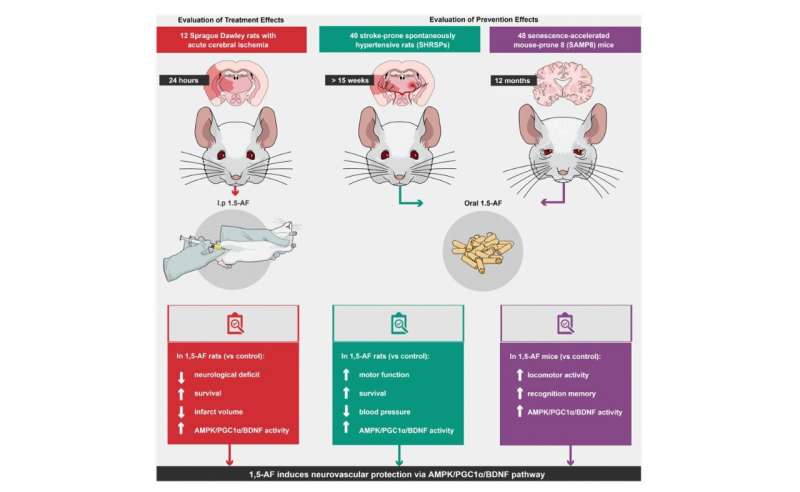This article has been reviewed according to Science X's editorial process and policies. Editors have highlighted the following attributes while ensuring the content's credibility:
fact-checked
proofread
Anti-aging effects of 1,5-anhydro-D-fructose on brain diseases via AMPK activation

A new research paper titled "1,5-anhydro-D-fructose induces anti-aging effects on aging-associated brain diseases by increasing 5'-adenosine monophosphate-activated protein kinase activity via the peroxisome proliferator-activated receptor-γ co-activator-1α/brain-derived neurotrophic factor pathway" has been published in Aging.
5'-Adenosine monophosphate-activated protein kinase (AMPK) is a metabolic sensor that serves as a cellular housekeeper; it also controls energy homeostasis and stress resistance. Thus, correct regulation of this factor can enhance health and survival. AMPK signaling may have a critical role in aging-associated brain diseases. Some in vitro studies have shown that 1,5-anhydro-D-fructose (1,5-AF) induces AMPK activation.
In this new study, researchers Kiyoshi Kikuchi, Shotaro Otsuka, Seiya Takada, Kazuki Nakanishi, Kentaro Setoyama, Harutoshi Sakakima, Eiichiro Tanaka, and Ikuro Maruyama from Kagoshima University investigated the effects of 1,5-AF on the AMPK/PGC-1α/BDNF pathway in multiple animal models of human aging-associated brain diseases.
The researchers state, "In the present study, we experimentally evaluated the effects of 1,5-AF on aging-associated brain diseases in vivo using an animal model of acute ischemic stroke (AIS), stroke-prone spontaneously hypertensive rats (SHRSPs), and the spontaneous senescence-accelerated mouse-prone 8 (SAMP8) model."
In the AIS model, intraperitoneal injection of 1,5-AF reduced cerebral infarct volume, neurological deficits, and mortality. In SHRSPs, oral administration of 1,5-AF reduced blood pressure and prolonged survival. In the SAMP8 model, oral administration of 1,5-AF alleviated aging-related decline in motor cognitive function. Although aging reduced the expression levels of peroxisome proliferator-activated receptor-γ co-activator-1α (PGC-1α) and brain-derived neurotrophic factor (BDNF), the researchers found that 1,5-AF activated AMPK, which led to upregulation of the PGC-1α/BDNF pathway.
"Our results suggest that 1,5-AF can induce endogenous neurovascular protection, potentially preventing aging-associated brain diseases. Clinical studies are needed to determine whether 1,5-AF can prevent aging-associated brain diseases," the researchers conclude.
More information: Kiyoshi Kikuchi et al, 1,5-anhydro-D-fructose induces anti-aging effects on aging-associated brain diseases by increasing 5'-adenosine monophosphate-activated protein kinase activity via the peroxisome proliferator-activated receptor-γ co-activator-1α/brain-derived neurotrophic factor pathway, Aging (2023). DOI: 10.18632/aging.205228




















